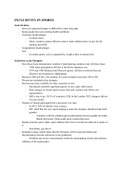Interview
IB Geography SL notes
- Course
- Institution
- Book
These notes were the ones I have taken throughout my IB geography class at standard level. The chapters they cover are: Climate Change Population Option E: Leisure, Sport and Tourism Option F: Food and Health
[Show more]




